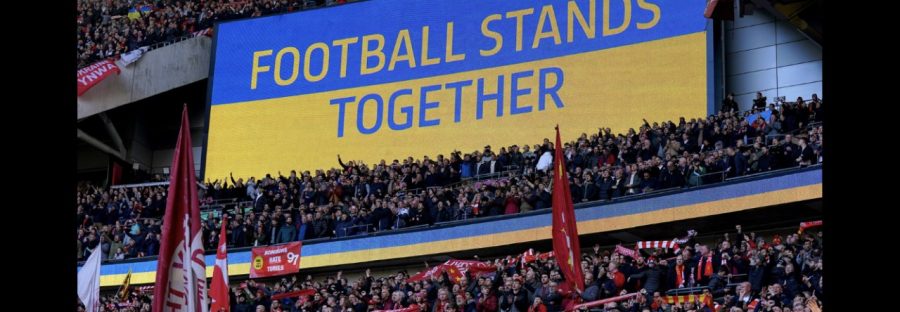Russia’s invasion of Ukraine: football is united in opposition to war by Putin
- Champions League final moved from St Petersburg to Paris
- Roman Abramovich forced to sell Chelsea
- 'Football can again be a vector for unity and peace among people', say FIFA and UEFA
The footballing community has been at the forefront in condemning the actions of Vladimir Putin’s aggression.
Since the invasion on 24 February, FIFA and UEFA have taken strong action against Russia, changing the venue of the Champions League final and banning Russian teams from participating in European tournaments.
Russian oligarch and billionaire Roman Abramovich is selling Chelsea after he is facing threats from the UK government that could see all of his assets frozen.
The Champions League final was due to be played at the Gazprom Arena in St Petersburg, but following a meeting on Friday UEFA confirmed that the new venue would be the Stade de France in Paris.
In a statement, UEFA said: “The UEFA executive committee decided to relocate the final of the 2021/22 UEFA Men’s Champions League from St Petersburg to Stade de France in St Denis.
“UEFA wishes to express its thanks and appreciation to French Republic president Emmanuel Macron for his personal support and commitment to have European club football’s most prestigious game moved to France at a time of unparalleled crisis.”
The governing body of football added: “We remain resolute in our solidarity with the football community in Ukraine and stand ready to extend our hand to the Ukrainian people.”
The change of venue of the final could impact both Manchester clubs who have aspirations to win the competition, but none bigger than Manchester City who are currently the bookies favourites to win their first European trophy.
Joe Ellison, a Manchester City fan and student in Manchester said: “The change of venue doesn’t really matter that much for me as a City fan.
“Obviously it is the right decision to make, we can’t have the final in Russia with all that they are doing.”
“I think every single Man City fan would prefer the venue to be in Paris.”
Also, the conflict developing in Ukraine is more personal for Man City as in their ranks is current Ukrainian captain Oleksandr Zinchenko.
The left-back hit out at the Russian invasion on Instagram stating: “I can’t stand back. My country belongs to Ukrainians and no one will ever be able to appropriate it. We will not give ours away! Glory to Ukraine.”
On Saturday, an emotional Zinchenko was seen embracing with fellow Ukrainian and Everton player Vitaliy Mykolenko at Goodison Park before their Premier League clash.
These emotions from Zinchenko and Mykolenko have been matched at football grounds across Europe.
There was a minute’s applause before the Carabao Cup final at Wembley on Sunday and in Portugal Roman Yaremchuk received a standing ovation after coming on as a substitute for Benfica, nearly reducing him to tears.
UEFA and FIFA have also come to the joint decision to ban all Russian teams, whether international or domestic, from participating in competitions until further notice.
This will impact the national team who were meant to play Poland in a World Cup play-off semi-final next month, and Spartak Moscow who were due to play RB Leipzig in the Europa League round of 16.
Sanctions
Catherine Danks, honorary research fellow at Man Met and specialist in Russian history, said: “The cancelling of football matches also needs to be understood not in isolation but as part of a range of measures including economic and trade sanctions, the cancellation of cultural events (eg: performances by Russian ballets, concerts) etc. that together put pressure on the Putin government.
“To carry on as normal as if nothing of any importance is happening in Ukraine, is not really an option as it feeds the illusion of normality.”
In a statement on Twitter, Spartak Moscow responded by saying: “The decision to exclude our team from the Europa League is upsetting.
“We believe that sport, even in the most difficult times, should aim to build bridges, and not burn them.”
Unlike the Russian side, the response from the wider football community has been positive to the news.
Fans online support the decision and British Prime Minister Boris Johnson said “well done FIFA and UEFA”.
Johnson and his government have also been critical of the close ties that Chelsea owner Roman Abramovich has with the Putin regime.
In Parliament, Labour MP and former minister Chris Bryant questioned the Russian billionaires ownership of the London club.
Assets
He said: “Surely Mr Abramovich should no longer be able to own a football club in this country? Surely we should be looking at seizing some of his assets including his £152m home?”
Since these comments Abramovich has come to the decision to sell Chelsea.
Abramovic said: “In the current situation, I have therefore taken the decision to sell the club, as I believe this is in the best interest of the club, the fans, the employees, as well as the club’s sponsors and partners.
“Moreover, I have instructed my team to set up a charitable foundation where all net proceeds from the sale will be donated. The foundation will be for the benefit of all victims of the war in Ukraine.”
The response to the sale from Chelsea fans has been one of admiration for Abramovich, who turned the club around in the last 20 years into a European powerhouse.
John Terry, former Chelsea and England captain labelled him as “the best” on Twitter.
The Best @ChelseaFC pic.twitter.com/L7PGR4Y46U
— John Terry (@JohnTerry26) March 3, 2022
Although a mixed response from Chelsea fans, there is no doubt that the reaction from the wider footballing community has been the correct one in response to Russia’s invasion of Ukraine.


